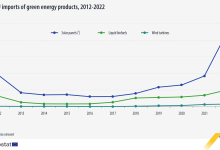SMR Project in Romania to Continue
NuScale Puts an End to Utah SMR Project
In 2020, the U.S. Department of Energy (DOE) approved $1.35 billion over 10 years for a nuclear power plant, known as the Carbon Free Power Project (CFPP). The Department has provided a NuScale-led joint venture approximately $600 million since 2014 to support the commercialization of SMR technologies.
NuScale in association with Utah Associated Municipal Power Systems (UAMPS) had planned to develop the six-reactor, 462-megawatt project and launch it in 2030, but several towns pulled out of the project. The NuScale plant in Utah was expected to be the first SMR to win a license from the US Nuclear Regulatory Commission for construction.
A U.S. DOE spokesman said it was unfortunate news but added: “We believe the work accomplished to date on the Carbon Free Power Project will be valuable for future nuclear energy projects. While not every project is guaranteed to succeed, DOE remains committed to doing everything we can to deploy these technologies to combat the climate crisis and increase access to clean energy,” the spokesperson said.
Existing U.S. nuclear power plants supply nearly half of the virtually carbon-free power generated in the U.S.
SMRs are designed to adapt to new applications, such as replacing closed coal-fired power plants and locating in remote communities, providing thermal energy for home heating in large urban areas.
John Hopkins, NuScale’s president and CEO, said in a statement that they and other customers will continue to bring U.S. small modular reactor (SMR) technology to market and grow the U.S. nuclear manufacturing base.
The failure to reach the set number of subscribers led NuScale and UAMPS to decide that terminating the project was the most prudent decision for both parties.
“Through our work with UAMPS and our partnership with the U.S. Department of Energy, we have advanced our NuScale Power Modules™ to the point that utilities, governments, and industrials can rely on a proven small modular reactor (SMR) technology that has regulatory approval and is in active production. Our work with CFPP over the past ten years has advanced NuScale technology to the stage of commercial deployment; reaching that milestone is a tremendous success which we will continue to build on with future customers,” said NuScale President and Chief Executive Officer John Hopkins. “NuScale will continue with our other domestic and international customers to bring our American SMR technology to market and grow the U.S. nuclear manufacturing base, creating jobs across the U.S. We thank UAMPS for the collaboration that has enabled this advancement.”
“This decision is very disappointing given the years of pioneering hard work put into the CFPP by UAMPS, CFPP LLC, NuScale, U.S. Department of Energy, and the UAMPS member communities that took the leadership role to launch the CFPP,” said UAMPS Chief Executive Officer and General Manager Mason Baker. “Yet, this decision is the best course for the UAMPS members participating in the CFPP and doing what is best for those member communities will always be the guiding light in such decisions. We have learned many invaluable lessons during the development of the CFPP that we will carry forward in future development work to meet the future energy needs of the UAMPS member communities. We look forward to continuing to provide innovative and cost-effective new resource solutions to our members, and, at the same time, we hope NuScale is successful in deploying its technology. We are working closely with NuScale and the U.S. Department of Energy on next steps to wind the project down,” Baker concluded.
The SMR project in Romania will not operate on the same subscription model that has been a stumbling block in the development of the project in the US, and it continues.
SMR technology is robust and based on technology with a history of over 60 years of safe operation in over 300 plants worldwide. Romania has 27 years of experience in the safe operation of nuclear power plants, and we have a chain of suppliers in the nuclear industry that can contribute to the development of projects and an education system at the highest standards in the engineering field that can allow it to continue the development of the construction of SMR, which Romania will need a lot in the 2050s.







